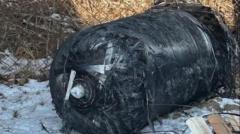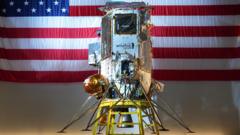At approximately 03:30 GMT Wednesday, a SpaceX Falcon 9 rocket made an uncontrolled re-entry into Earth's atmosphere, leading to debris falling across Northern Europe, notably in Poland and potentially Ukraine. Witnesses reported seeing a fiery object streaking across the sky, prompting a mix of awe and fear among onlookers.
SpaceX Rocket Debris Causes Spectacle and Concern in Europe

SpaceX Rocket Debris Causes Spectacle and Concern in Europe
Uncontrolled re-entry of a Falcon 9 rocket leaves debris in Poland and raises safety questions.
The event unfolded when Simon Eriksson, a worker in Malmo, described the scene as reminiscent of a sci-fi film. The rocket debris landed behind a warehouse in Komorniki, Poland, where local resident Adam Borucki discovered a charred tank measuring about 1.5m by 1m. Fortunately, no injuries were reported.
Polish police collaborated with the Polish Space Agency (Polsa) to confirm the origin of the debris as a Falcon 9 rocket. The second stage of the rocket was expected to return to the Pacific Ocean in a controlled manner after a launch from Vandenberg Air Force Base on February 1. However, a failure had caused it to orbit Earth and re-enter uncontrollably around 04:46-04:48 on February 19.
Astrophysicist Dr. Jonathan McDowell highlighted the rarity of such incidents and noted a concerning trend of increasing engine failures that may lead to unsafe re-entries. The debris has sparked discussions regarding the growing volume of space junk and the potential risks it poses as space exploration continues to expand.
With pieces confirmed in Poland and suspicions of debris falling in Ukraine, concerns about safety and management of space debris are mounting as incidents involving SpaceX rockets continue to occur.
The incident serves as a stark reminder of the implications of modern space activities and the technologies involved, prompting open dialogue about the responsibilities of private space companies in ensuring public safety and managing the increasingly crowded low Earth orbit.
Elon Musk's company has not yet commented on the fallout from this incident, leaving many to ponder the consequences of the expanding frontiers of space exploration.
Polish police collaborated with the Polish Space Agency (Polsa) to confirm the origin of the debris as a Falcon 9 rocket. The second stage of the rocket was expected to return to the Pacific Ocean in a controlled manner after a launch from Vandenberg Air Force Base on February 1. However, a failure had caused it to orbit Earth and re-enter uncontrollably around 04:46-04:48 on February 19.
Astrophysicist Dr. Jonathan McDowell highlighted the rarity of such incidents and noted a concerning trend of increasing engine failures that may lead to unsafe re-entries. The debris has sparked discussions regarding the growing volume of space junk and the potential risks it poses as space exploration continues to expand.
With pieces confirmed in Poland and suspicions of debris falling in Ukraine, concerns about safety and management of space debris are mounting as incidents involving SpaceX rockets continue to occur.
The incident serves as a stark reminder of the implications of modern space activities and the technologies involved, prompting open dialogue about the responsibilities of private space companies in ensuring public safety and managing the increasingly crowded low Earth orbit.
Elon Musk's company has not yet commented on the fallout from this incident, leaving many to ponder the consequences of the expanding frontiers of space exploration.




















